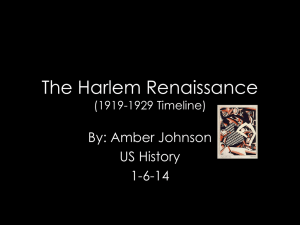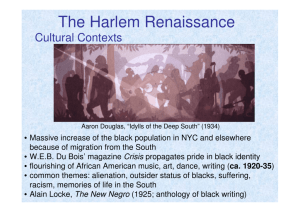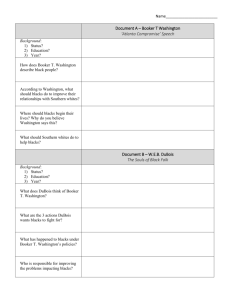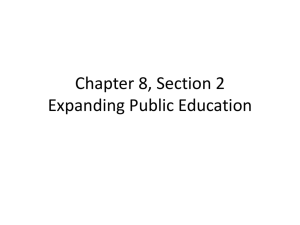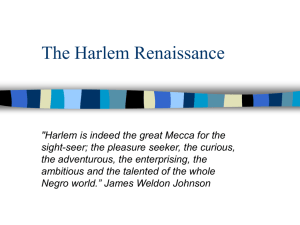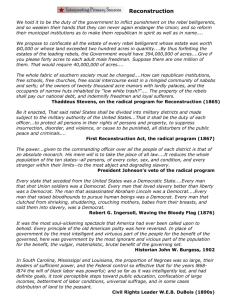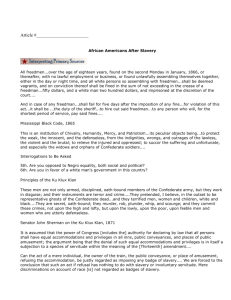File - Melissa Nowell
advertisement
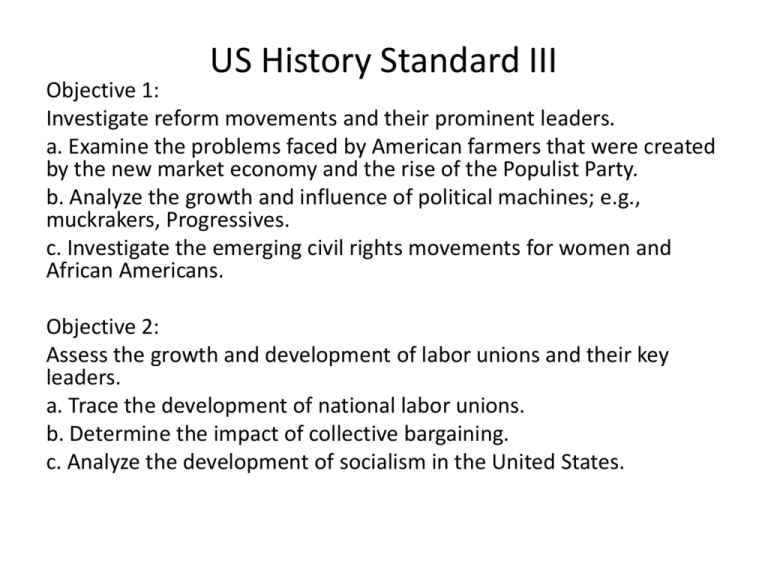
US History Standard III Objective 1: Investigate reform movements and their prominent leaders. a. Examine the problems faced by American farmers that were created by the new market economy and the rise of the Populist Party. b. Analyze the growth and influence of political machines; e.g., muckrakers, Progressives. c. Investigate the emerging civil rights movements for women and African Americans. Objective 2: Assess the growth and development of labor unions and their key leaders. a. Trace the development of national labor unions. b. Determine the impact of collective bargaining. c. Analyze the development of socialism in the United States. Dropping Prices and Debt The Populist movement was a revolt in the 1880’s by farmers in the South and Midwest against the Democratic and Republican Parties for ignoring their interests and difficulties. For over a decade, farmers were suffering from crop failures, falling prices, poor marketing, and lack of credit facilities. Many farmers were in debt due to a drought that affected the Midwest in the 1880s. At the same time, prices for Southern cotton dropped. These disasters, combined with resentment against railroads, money-lenders, grainelevator owners, and others with whom farmers did business, led farmers to organize. The Populist Party Farmers began joining a political group called the Farmer’s Alliance and rallied for agricultural and other reforms. After gaining such wide-spread support, the Farmer’s Alliance became The Populist Party and began to rally for it’s own candidate for President of the United States. The Party called upon the federal government to buffer economic depressions, regulate banks and corporations, and help farmers who were suffering hard times. Presidental Candidate In 1892 the Populist presidential candidate, James B. Weaver, won more than 1,000,000 popular votes. The party elected several members to Congress, three governors, and hundreds of minor officials and legislators, nearly all in the Midwest. In the South, they challenged white supremacy by forming coalitions with black farmers in common cause. In the South In spite of the popularity of the Populist Party and its ideals of racial equality the South held to its support of Democrats. Using fraud and violence, and rallying support by appealing to white supremacy, the Democrats held on to their power in many Southern states. Many Democrats refused to endanger white supremacy by voting against the Democratic Party in favor of the Populist Party. Perseverance paid off when in 1896 the Populists fused into the Democratic Party, changing the Democratic party forever. Muckraker The term "muckraker" was taken from the fictional character in John Bunyan's Pilgrim's Progress, a man who was consigned to rake muck endlessly, never lifting his eyes from his drudgery. President Theodore Roosevelt, frustrated by writer’s who wrote incessantly about societal abuses and inefficiencies berated those whose writings fervently called for reform in a speech given in April of 1906. Speech In Bunyan's "Pilgrim's Progress" you may recall the description of the Man with the Muck Rake, the man who could look no way but downward, with the muck rake in his hand; who was offered a celestial crown for his muck rake, but who would neither look up nor regard the crown he was offered, but continued to rake to himself the filth of the floor. In "Pilgrim's Progress" the Man with the Muck Rake is set forth as the example of him whose vision is fixed on carnal instead of spiritual things. Yet he also typifies the man who in this life consistently refuses to see aught that is lofty, and fixes his eyes with solemn intentness only on that which is vile and debasing. Now, it is very necessary that we should not flinch from seeing what is vile and debasing. There is filth on the floor, and it must be scraped up with the muck rake; and there are times and places where this service is the most needed of all the services that can be performed. But the man who never does anything else, who never thinks or speaks or writes, save of his feats with the muck rake, speedily becomes, not a help but one of the most potent forces for evil. -Theodore Rooservelt The Power of the Pen People in the United States had long been displeased with the unsafe conditions, political corruption and social injustice of the industrial age, but it was not until the late 19th century that newspapers and magazines began to publish articles criticizing corrupt or unsafe industries. Writers, called muckrakers, directed their criticisms against oil, beef and tobacco industries and wrote about prison conditions, the exploitation of natural resources, the tax system, the insurance industry, pension practices and food processing, among others. Upton Sinclair’s The Jungle Upton Sinclair published The Jungle in 1905 to expose labor abuses in the meat packing industry. But it was food, not labor, that most concerned the public. Sinclair's horrific descriptions of the industry led to the passage of the Pure Food and Drug Act and the Meat Inspection Act, not to labor legislation. Reform Although muckrakers attracted a great deal of negative attention, their writings often brought about reform that otherwise may not have been as speedy or widespread. Progressives Progressives were social reformers who were focused on using politics to help those facing harsh conditions at home and at work. American Presidents who embraced the progressive platform were Theodore Roosevelt, Woodrow Wilson, Franklin Delano Roosevelt and Lyndon Baines Johnson. Origins of Progressive Movement • Organized originally by Theodore Roosevelt, the Progressive Party lobbied for tariff reform (tax on imports imposed to keep American goods a strong market), stricter regulation of industrial combinations (businesses who merge ideas or industry for a mutual benefit), women’s suffrage, prohibition of child labor, and other reforms. Civil Rights for Women Women’s suffrage is the right of women to vote and to run for office. The movement to gain these rights for women was born around the turn of the century. Suffragists Several generations of woman suffrage supporters lectured, wrote, marched, lobbied, and practiced civil disobedience to achieve what many Americans considered a radical change in the Constitution. Militant suffragists used tactics such as parades, silent vigils, and hunger strikes. Victory Passed by Congress June 4, 1919, and ratified on August 18, 1920, the 19th amendment guarantees all American women the right to vote. Achieving this milestone required a lengthy and difficult struggle; victory took decades of agitation and protest. Few early supporters lived to see final victory in 1920. Civil Rights for African Americans Black Codes of Reconstruction Era 13th Amendment 14th Amendment 15th Amendment Plessey v. Ferguson Birth of a Nation Jim Crow Laws Marcus Garvey: “Return to Africa” movement Universal Negro Improvement Association The Black Church Southern Baptist Convention African Methodist Episcopal Church AME Zion Church Historically black colleges and universities WEB Dubois NAACP Booker T. Washington Tuskegee Institute The Crisis A.Philip Randolph: “The New Negro” The Great Migration The Scottsboro Boys and the Communist Party The Double V Campaign Nation of Islam Malcolm X Racial Equality Black Americans’ quest for official racial equality began the moment Reconstruction ended in the late 1870s. Even though Radical Republicans had attempted to aid blacks by passing the Civil Rights Act of 1866, the Ku Klux Klan Act, the Civil Rights Act of 1875, as well as the Fourteenth Amendment and Fifteenth Amendment, racist whites in the South ensured that blacks remained “in their place.” The black codes, for example, as well as literacy tests, poll taxes, and widespread violence kept blacks away from voting booths, while conservative Supreme Court decisions ruined any chances for social equality. The Compromise of 1877 effectively doomed southern blacks to a life of sharecropping and second-class citizenship. spark notes http://www.sparknotes.com/history/american/c ivilrights/summary.html Black Codes of Reconstruction Era The Black Codes were laws in the United States after the Civil War with the effect of limiting the civil rights and civil liberties of blacks. Each endeavored to secure a steady supply of cheap labor, and continued to assume the inferiority of the freed slaves. In many states, if unemployed, blacks faced the potential of being arrested and charged with vagrancy. Codes dictated their hours of labor, duties, and the behavior assigned to them as agricultural workers. Even the freedom to chose a type of work was often regulated. Often blacks were prohibited from entering towns without permission. A note was required, and it had to state the nature and length of the visit. Any black found without a note after ten o'clock at night was subject to imprisonment. By 1866, Black Codes were suspended by federal officials. Louisiana Black Code (1865) Louisiana Introduction After the region's slaves were freed, Southern communities passed laws called "black codes" to control black citizens. The first states to pass black codes were Mississippi and South Carolina; other Southern states soon followed. Exact provisions of these laws varied from state to state, but their effect was similar. Read the following provisions of a Louisiana parish's black codes and evaluate their impact. Questions to Consider (use next two slides to answer these questions) Questions to Consider What were the black codes? List some of the restrictions placed on black citizens in this Louisiana parish. Why were these black codes so restrictive? Speculate about how these laws were enforced. What impact would these laws have had on the black community? Source : Louisiana Black Codes . . . Sec. 1. Be it ordained by the police jury of the parish of St. Landry, That no negro shall be allowed to pass within the limits of said parish without special permit in writing from his employer. Whoever shall violate this provision shall pay a fine of two dollars and fifty cents, or in default thereof shall be forced to work four days on the public road, or suffer corporeal punishment as provided hereinafter. . . . Sec. 3. . . . No negro shall be permitted to rent or keep a house within said parish. Any negro violating this provision shall be immediately ejected and compelled to find an employer; and any person who shall rent, or give the use of any house to any negro, in violation of this section, shall pay a fine of five dollars for each offence. Sec. 4. . . . Every negro is required to be in the regular service of some white person, or former owner, who shall be held responsible for the conduct of said negro. But said employer or former owner may permit said negro to hire his own time by special permission in writing, which permission shall not extend over seven days at any one time. . . . Sec. 5. . . . No public meetings or congregations of negroes shall be allowed within said parish after sunset; but such public meetings and congregations may be held between the hours of sunrise and sunset, by the special permission in writing of the captain of patrol, within whose beat such meetings shall take place. . . . Sec. 6. . . . No negro shall be permitted to preach, exhort, or otherwise declaim to congregations of colored people, without a special permission in writing from the president of the police jury. . . . Sec. 7. . . . No negro who is not in the military service shall be allowed to carry firearms, or any kind of weapons, within the parish, without the special written permission of his employers, approved and indorsed by the nearest and most convenient chief of patrol. . . . Sec. 8. . . . No negro shall sell, barter, or exchange any articles of merchandise or traffic within said parish without the special written permission of his employer, specifying the article of sale, barter or traffic. . . . Sec. 9. . . . Any negro found drunk, within the said parish shall pay a fine of five dollars, or in default thereof work five days on the public road, or suffer corporeal punishment as hereinafter provided. Sec. 11. . . . It shall be the duty of every citizen to act as a police officer for the detection of offences and the apprehension of offenders, who shall be immediately handed over to the proper captain or chief of patrol. . . . Plessey v Ferguson “Separate but Equal” In 1890, Louisiana passed a statute called the Separate Car Act declaring that all rail companies carrying passengers in Louisiana must provide separate but equal accommodations for white and non-white passengers. The penalty for sitting in the wrong compartment was a fine of $25 or 20 days in jail. Plessey A group of black citizens joined forces with the East Louisiana Railroad Company to fight the Act. In 1892, Homer Plessey, who was one-eighth black, purchased a first-class ticket and sat in the whitedesignated railroad car. Plessey was arrested for violating the Separate Car Act and argued in court that the Act violated the Thirteenth and Fourteenth Amendments to the Constitution. After losing twice in the lower courts, Plessey took his case to the U.S. Supreme Court, which upheld the previous decisions that racial segregation is constitutional under the separate but equal doctrine. The Great Migration As a result of worsening conditions in the South, and primarily because of the Plessey v. Ferguson ruling, blacks began to head to the Northern United States by the millions. Racism, while still a serious obstacle, was considered much less brutal there than in the South. In addition, the North granted all adult men with the right to vote; provided better educational advancement for African-Americans and their children; and offered greater job opportunities as a result of World War I and the industrial revolution. This phenomenon, known as the Great Migration, brought more than seven million African-Americans to the North. 13th Amendment: Passed by Congress on January 31, 1865, and ratified on December 6, 1865, the 13th amendment abolished slavery in the United States and provides that "Neither slavery nor involuntary servitude, except as a punishment for crime whereof the party shall have been duly convicted, shall exist within the United States, or any place subject to their jurisdiction.". 14th Amendment: Forbids states from denying any person "life, liberty or property, without due process of law" or to "deny to any person within its jurisdiction the equal protection of the laws.” By directly mentioning the role of the states, the 14th Amendment greatly expanded the protection of civil rights to all Americans and is cited in more litigation than any other amendment. 15th Amendment: "the right of citizens of the United States to vote shall not be denied or abridged by the United States or by any State on account of race, color, or previous condition of servitude." One day after it was adopted, Thomas Peterson-Mundy of Perth Amboy, New Jersey, became the first African American to vote under the authority of the 15th Amendment. Birth of a Nation The racism that African Americans experienced in both the South and the North during the war years could be glimpsed in many arenas of American life, including the movies. It is not surprising, perhaps, that The Birth of a Nation, which appeared in March 1915, was both one of the landmarks in the history of American cinema and a landmark in American racism. The film is based partly on the novel and play The Clansman written by Thomas Dixon in 1906 and portrays the violence and racism of the time as is indicated in the following sentiment expressed by its author: “My object is to teach the North, the young North, what it has never known-the awful suffering of the white man during the dreadful Reconstruction period. I believe that Almighty God anointed the white men of the South by their suffering during that time . . . to demonstrate to the world that the white man must and shall be supreme.” Jim Crow Laws A term for racist laws and social orders in the South that kept blacks separate from and subordinate to whites. The Jim Crow laws that appeared after the Plessey v. Ferguson ruling of 1896 forced blacks to sit, eat, sleep, study, and work in separate facilities (although these Jim Crow laws were not as harsh as the black codes of the Reconstruction era). See www.youtube.org: The History of Jim Crow Part 1, 2 and 3 Jim Crow Laws See: www.ferris.edu: Jim Crow Museum Jim Crow See youtube.org Jump Jim Crow Throughout the 1830s and '40s, the white entertainer Thomas Dartmouth Rice (1808-1860) performed a popular songand-dance act supposedly modeled after a slave. He named the character Jim Crow. Rice darkened his face, acted like a buffoon, and spoke with an exaggerated and distorted imitation of African American Vernacular English. In his Jim Crow persona, he also sang "Negro ditties" such as "Jump Jim Crow." Black Face When performing as minstrels, white performers used burnt cork and greasepaint or shoe polish to darken their skin and red or white makeup to exaggerate their lips. They also wore woolly wigs and ragged clothes to imitate and ridicule African Americans. Ironically, by the 1840s, even some black entertainers were darkening their already dark skin and performing in blackface as minstrels. Marcus Garvey: “Return to Africa” movement and Universal Negro Improvement Association Garvey was a Jamaican-born black nationalist who created a 'Back to Africa' movement in the United States. He became an inspirational figure for later civil rights activists. He returned to Jamaica in 1914 and founded the Universal Negro Improvement Association (UNIA). In 1916, Garvey moved to Harlem in New York where UNIA thrived. By now a formidable public speaker, Garvey spoke across America. He urged African-Americans to be proud of their race and return to Africa, their ancestral homeland and attracted thousands of supporters. To facilitate the return to Africa that he advocated, in 1919 Garvey founded the Black Star Line, to provide transportation to Africa, and the Negro Factories Corporation to encourage black economic independence. Garvey also unsuccessfully tried to persuade the government of Liberia in west Africa to grant land on which black people from America could settle. The Black Church The Southern Baptist Convention, African Methodist Episcopal Church, AME Zion Church and other African American churches have long been the centers of communities. They served as school sites in the early years after the Civil War, have taken up social welfare functions, such as providing for the indigent, and going on to establish schools, orphanages and prison ministries. As a result, black churches have fostered built strong community organizations and provided spiritual and political leadership, especially during the civil rights movement. Black Colleges and Universities There are 105 historically black colleges and universities (HBCUs) in the United States, including public and private, two-year and four-year institutions, medical schools and community colleges. A Historically Black College or University had the mission of educating Blacks while being open to all. Spelman College Howard University Morehouse College Hampton University Fisk University Xavier University of Louisiana Tuskegee University Founded in 1881, Claflin University Spelman College is an all-girls liberal arts college. Dillard University Florida A&M University Booker T. Washington Booker Taliaferro Washington was an African-American educator, author, orator, and advisor to Republican presidents. He was the dominant leader in the African-American community in the United States from 1890 to 1915. In 1881, he founded the Tuskegee Normal and Industrial Institute in Alabama (now known as Tuskegee University), which grew immensely and focused on training African Americans in agricultural pursuits. A political adviser and writer, Washington clashed with intellectual W.E.B. Du Bois over the best avenues for racial uplift. In 1881, the Alabama legislature approved $2,000 for a "colored" school, the Tuskegee Normal and Industrial Institute (now known as Tuskegee University). General Armstrong was asked to recommend a white man to run the school, but instead recommended Booker T. Washington. Classes were first held in an old church. Booker T. Washington called on white America to provide jobs and industrialagricultural education for Negroes. In exchange, blacks would give up demands for social equality and civil rights. His message to the Negro was that political and social equality were less important as immediate goals than economic respectability and independence. Washington believed that if blacks gained an economic foothold, and proved themselves useful to whites, then civil rights and social equality would eventually be given to them. Blacks were urged to work as farmers, skilled artisans, domestic servants, and manual laborers to prove to whites that all blacks were not liars and chicken thieves. Washington wrote Up From Slavery. See mini-bio on www.biography.com Tuskegee Institute The Tuskegee Negro Normal Institute was opened on the 4th July, 1888. The school was originally a shanty building owned by the local church. The school only received funding of $2,000 a year and this was only enough to pay the staff. Eventually Booker T. Washington was able to borrow money from the treasurer of the Hampton Agricultural Institute to purchase an abandoned plantation on the outskirts of Tuskegee and built his own school. The school taught academic subjects but emphasized a practical education. This included farming, carpentry, brickmaking, shoemaking, printing and cabinetmaking. This enabled students to become involved in the building of a new school. Students worked long-hours, arising at five in the morning and finishing at nine-thirty at night. Tuskegee Airmen of WWII Before 1940, African Americans were barred from flying for the U.S. military. Civil rights organizations and the black press exerted pressure that resulted in the formation of an all AfricanAmerican pursuit squadron based in 1941 at the Tuskegee Institute in Tuskegee, Alabama. They became known as the Tuskegee Airmen. View: “Red Tails” film on Tuskegee Airmen. WEB Dubois Du Bois was born and raised in Massachusetts, and graduated in 1888 from Fisk University, a black liberal arts college in Nashville, Tennessee. During the summer, he taught in a rural school and later wrote about his experiences in his book THE SOULS OF BLACK FOLK. All of his efforts were geared toward gaining equal treatment for black people in a world dominated by whites and toward marshaling and presenting evidence to refute the myths of racial inferiority. In 1905 Du Bois was a founder and general secretary of the Niagara movement, an African American protest group of scholars and professionals. Du Bois founded and edited the Moon (1906) and the Horizon (1907-1910) as organs for the Niagara movement. In 1909 Du Bois was among the founders of the National Association for the Advancement of Colored People (NAACP) and from 1910 to 1934 served it as director of publicity and research, a member of the board of directors, and editor of the Crisis, its monthly magazine. Du Bois was active in pan-Africanism and concerned with the conditions of people of African descent wherever they lived. In 1900 he attended the First Pan-African Conference held in London, was elected a vice president, and wrote the "Address to the Nations of the World." See www.biography.com Booker T. vs. W.E.B. Booker T. Washington, educator, reformer and the most influential black leader of his time (1856-1915) preached a philosophy of self-help, racial solidarity and accommodation. He urged blacks to accept discrimination for the time being and concentrate on elevating themselves through hard work and material prosperity. He believed in education in the crafts, industrial and farming skills and the cultivation of the virtues of patience, enterprise and thrift. This, he said, would win the respect of whites and lead to African Americans being fully accepted as citizens and integrated into all strata of society. W.E.B. Du Bois, a towering black intellectual, scholar and political thinker (1868-1963) said no--Washington's strategy would serve only to perpetuate white oppression. Du Bois advocated political action and a civil rights agenda (he helped found the NAACP). In addition, he argued that social change could be accomplished by developing the small group of college-educated blacks he called "the Talented Tenth:" Booker T. and W.E.B. Booker T. Washington and W.E.B. DuBois By Dudley Randall "It seems to me," said Booker T., "It shows a mighty lot of cheek To study chemistry and Greek When Mister Charlie needs a hand To hoe the cotton on his land, And when Miss Ann looks for a cook, Why stick your nose inside a book?" "I don't agree," said W.E.B. "If I should have the drive to seek Knowledge of chemistry or Greek, I'll do it. Charles and Miss can look Another place for hand or cook, Some men rejoice in skill of hand, And some in cultivating land, But there are others who maintain The right to cultivate the brain." "It seems to me," said Booker T., "That all you folks have missed the boat Who shout about the right to vote, And spend vain days and sleepless nights In uproar over civil rights. Just keep your mouths shut, do not grouse, But work, and save, and buy a house." "I don't agree," said W.E.B. "For what can property avail If dignity and justice fail? Unless you help to make the laws, They'll steal your house with trumped-up clause. A rope's as tight, a fire as hot, No matter how much cash you've got. Speak soft, and try your little plan, But as for me, I'll be a man." "It seems to me," said Booker T.-"I don't agree," Said W.E.B. The Crisis The Crisis is the official publication of the National Association for the Advancement of Colored People (NAACP). It features African American commentary on current affairs. In the past, it has also featured African American literature prominently, and was one of the major magazines of the Harlem Renaissance. Harlem, New York African-Americans began moving to Harlem, on the island of Manhatten, New York en masse; between 1900 and 1920 the number of blacks in the New York City neighborhood doubled. By the time the planned subway system and roadways reached Harlem, many of the country's best and brightest black advocates, artists, entrepreneurs, and intellectuals had situated themselves in Harlem. They brought with them not only the institutions and businesses necessary to support themselves, but a vast array of talents and ambitions. The area soon became known as “the Black Mecca” and “the capital of black America.” Three Headquarters in Harlem The three groups: NAACP founded by W.E.B. Dubous, the “Back to Africa Movement,” begun by Marcus Garvey and the the National Urban League (NUL) founded by Ruth Standish Baldwin and Dr. George Edmund Haynes all built their headquarters in Harlem. Harlem Renaissance Instead of using more direct political means to achieve their goals, African-American civil rights activists employed the artists and writers of their culture to work for the goals of civil rights and equality. Jazz music, African-American fine art, and black literature were all absorbed into mainstream culture, bringing attention to a previously disenfranchised segment of the American population. This blossoming of African-American culture in European-American society, particularly in the worlds of art and music, became known as The Harlem Renaissance. NAACP The NAACP was an organization founded by W. E. B. Du Bois and several white northerners that sought to achieve legal victories for blacks, especially the reversal of the “separate but equal” doctrine established by the Supreme Court in the 1896 Plessey v. Ferguson decision. A.Philip Randolph: “The New Negro” Asa Philip Randolph was a leader in the African-American civil-rights movement, the American labor movement and socialist political parties. He began his efforts on behalf of African-American laborers when, while working as a waiter on a coastal steamship, he organized a protest against their living conditions. He organized and led the Brotherhood of Sleeping Car Porters, the first predominantly Black labor union. After WWI, he became more convinced than ever that unions would be the best way for African-Americans to improve their lot. In 1925, he founded the Brotherhood of Sleeping Car Porters and served as the president until 1968. The Double V Campaign The African-American struggle for full citizenship took heightened form during the World War II years. The slogan "Double V"—"victory abroad over Nazism and victory at home over racism and inequality"—enabled African-American leaders to build coalitions and garner public support for an ongoing civil rights campaign. Double V was, however, more than a slogan; it was an ideology that invoked the necessity of a vigilant fight for democracy. Organizations and individuals across the political and programmatic spectrum found common ground under the ideological umbrella of the Double V. Malcolm X Malcolm X, born Malcolm Little and also known as El-Hajj Malik El-Shabazz, was an African-American Muslim minister and human rights activist. In his later years, Malcolm X traveled to Detroit, where he worked with the leader of the Nation of Islam, Elijah Muhammad, to expand the movement's following among black Americans nationwide. Malcolm X became the minister of Temple No. 7 in Harlem and Temple No. 11 in Boston, while also founding new temples in Harford and Philadelphia. In 1960, he established a national newspaper, Muhammad Speaks, in order to further promote the message of the Nation of Islam. Articulate, passionate and a naturally gifted and inspirational orator, Malcolm X exhorted blacks to cast off the shackles of racism "by any means necessary," including violence. "You don't have a peaceful revolution," he said. "You don't have a turn the cheek revolution. There's no such thing as a nonviolent revolution." Nation of Islam A group founded in 1930 to promote black nationalism in Detroit’s black community during the Great Depression. Under the early leadership of Elijah Muhammad, the organization appealed to the poorest urban blacks and quickly spread to the major cities in the East. Malcolm X emerged as the organization’s chief spokesman in the early 1950s and continued to push for black independence from whites and self-reliance in daily life. The Nation of Islam also operated many stores in urban black neighborhoods throughout America to promote black economic independence.
